ShelfConfidence
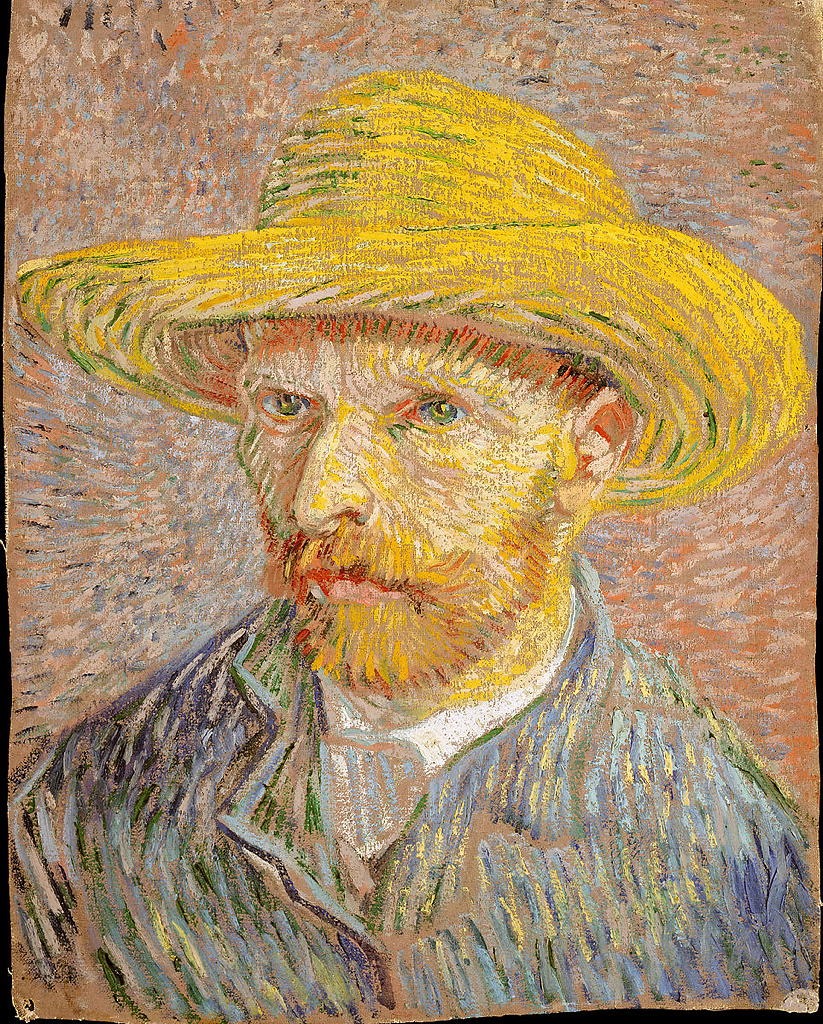
Vincent van Gogh: Self-Portrait with a Straw Hat [obverse: The Potato Peeler] (1887)
"Here I come!"
Writing might be the very most introverted activity ever devised. Authoring, a staging and performing of the writer's product, seems the opposite. As a writer, I've long wondered who I thought I was writing for, with various responses, though I mostly seem to be writing to and for myself, as insular and recursive as that might seem. Authoring's queuing up that internal stuff for more public distribution and consumption, from the perspective of the writer's solipsistic whispering, an audacious act. Posting my pieces began as tiny outrageous acts, duck and cover operations, as if I was chucking each one over a sturdy wall to splat down near unnamed targets. As I attracted an audience, the possibility of becoming an adviser arose, but I've mostly chosen to share the echoing I witness happening within my head. Any advice I might give tends to come obliquely, by example, the transcribed dialogue between me, myself, and I. I lack the self confidence to otherwise promote my internal dialogues. I've mostly just chucked them over walls like unguided missiles, hopeful that they won't do too much damage or spark too awfully many complaints.
Authoring drags that self-effacing operation out of its closet, or seems to threaten to.
DreadLines

Rembrandt van Rijn: Abraham's Sacrifice (1655)
"Some days, I manage to walk through walls."
I deeply dislike the term Deadline when used to denote a point where an assignment's supposed to be completed. It connotes something almost never evident, that the date represents a drop dead point, that somebody will die should that expectation not be satisfied. This is so rarely the case, that Deadline amounts to hyperbole, intended, perhaps, to rile up the more existential instincts. I've seen project teams go insane in the shadow of an impending Deadline, though I've yet to see anybody actually die when the Deadline wasn't met. They're mostly never met. A trumped up threat might serve as the very last thing most project teams seem to need to motivate them to perform.
I've proposed calling them Stay Awake Dates, points of special awareness well short of existential dread.
OtherWorlds
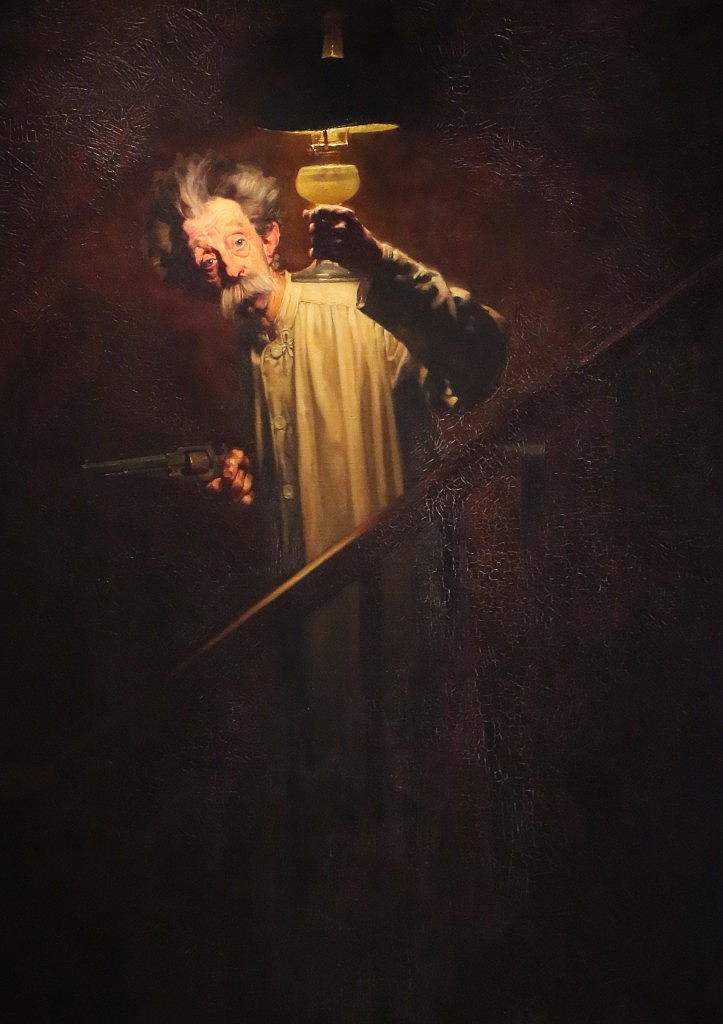
Norman Rockwell: General Electric Promotional Poster
"What a Protection Electric Light Is." (1925)
"We must be blind to enter OtherWorlds …"
Authoring intrudes upon OtherWorlds. Even when producing a work of current affairs, currency quickly slips into the recent past before further immersing itself into even foggier history. Our current world quickly shifts into OtherWorlds, too, its literature—fiction, non-fiction, reference—probably irrelevant for its original intentions. Even our current world, slippery though it might seem, favors certain orders. It wants originality but not unfamiliarity. It wants inventive similarity, not precisely a copy, for that might border on plagiarism or worse, produce a derivative work. It wants an urgency, as if a work should carry a critical message such that receiving it might stave off some catastrophe. It might seek the avant garde but rarely the weird. Beatniks without beards. Hippies with clean hair and pressed jeans. A reassuring future.
Any author seeking sanity should probably consider changing careers or just stop listening to what anyone insists that they want them to produce.
Ambivalence
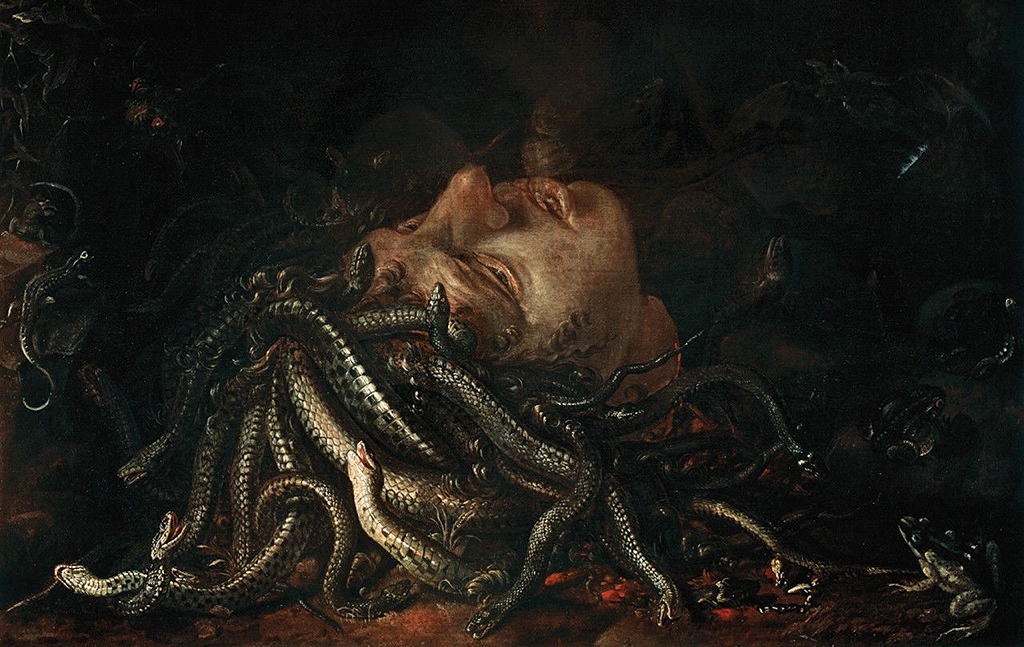
Head of Medusa, originally attributed to Leonardo Da Vinci.
This painting was later believed to have been created by a Flemish painter in the late 16th or early 17th century.
"Authoring seems to want its own pace …"
Nearly forty days into my Authoring effort, I notice a few snakes in my head. I know, like you know, that a genuine Hero's Journey should feature a steadfast and stalwart hero, someone holding unwavering dedication, not someone questioning his charter or purpose, yet this hero has been holding a few questions. I've found through decades of engagements, that at some point—it doesn't really matter if that point comes nearer the beginning, middle, or end—it can prove useful to apply some focused ambivalence upon an imperative effort. Especially if it seemed as if it absolutely has to get finished … or else, that there exists no reasonable alternative to successfully navigating the course, no matter how harrowing, that not succeeding would be tantamount to failure, it's especially important to reconsider again just how essential the effort might have not become. Is the race still worth running? Or else what?
I store this tactic in my Anything But That! drawer, one I only rarely ever open.
TheFortunateFew

Self-portrait of Nicolas Régnier painting a portrait of Vincenzo Giustiniani (1623-24)
" … my steadily eroding naiveté sipping bitter coffee."
As details of my Authoring initiative have come into focus, I realize that these have most often appeared as fresh insults to my originating naiveté, disappointments and difficulties. Some have valiantly attempted to reassure me that I'm probably not as crazy as I seem to feel, given my testimony, and I sincerely appreciate these attempts, for I am probably not as crazy as I sometimes feel. All told, or enough told to find a coherent thread, I remain one of TheFortunateFew. I am pursuing some ends larger than my original footprints. I'm testing edges. I'm making discoveries. I might even be making a difference, though that assessment must wait until I'm through this gauntlet. I believe that any worthwhile initiative must necessarily start as a sincere expression of the protagonist's innocence. His naiveté. However experienced he might have been then, his prior experience will have to become irrelevant in light of what this latest adventure manifests. The process by which naiveté wises up, that's the means by which the worthwhile emerges here. It was never different.
Each discovery which disqualifies some element of the initiating naiveté can seem brutal if not necessarily vicious.
HollowingDays
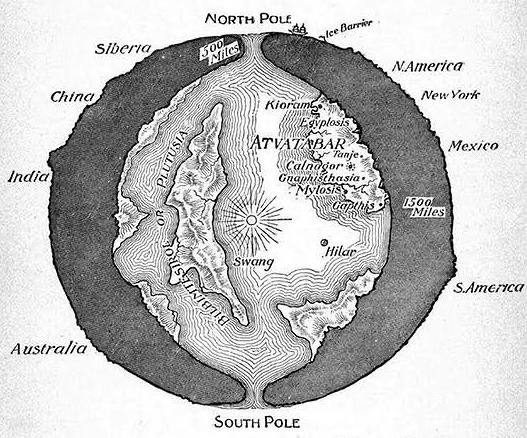
A cross-sectional drawing of the planet Earth
showing the "Interior World" of Atvatabar,
from William R. Bradshaw's 1892 science-fiction novel
The Goddess of Atvatabar
"This, too, should ultimately pass."
Much of what constitutes Authoring amounts to isolated effort. From ideation through writing, collating through editing, everything could occur in solitary confinement, and does, or might just as well. Especially during This Damned Pandemic, alternative activities seem few and ever further between. When even heading out for a haircut gives pause, and should, this author most often chooses to simply anti-socially distance. The cats have come to know me too well, they sense my intentions better than I do myself. I live at their beck and call since I'm always nearby, never gone, but increasingly absent for myself here, too, as January degrades into HollowingDays.
The outside temperature has not varied more than three degrees in weeks, freezing plus or minus two. Chilling.
GrandDelusion
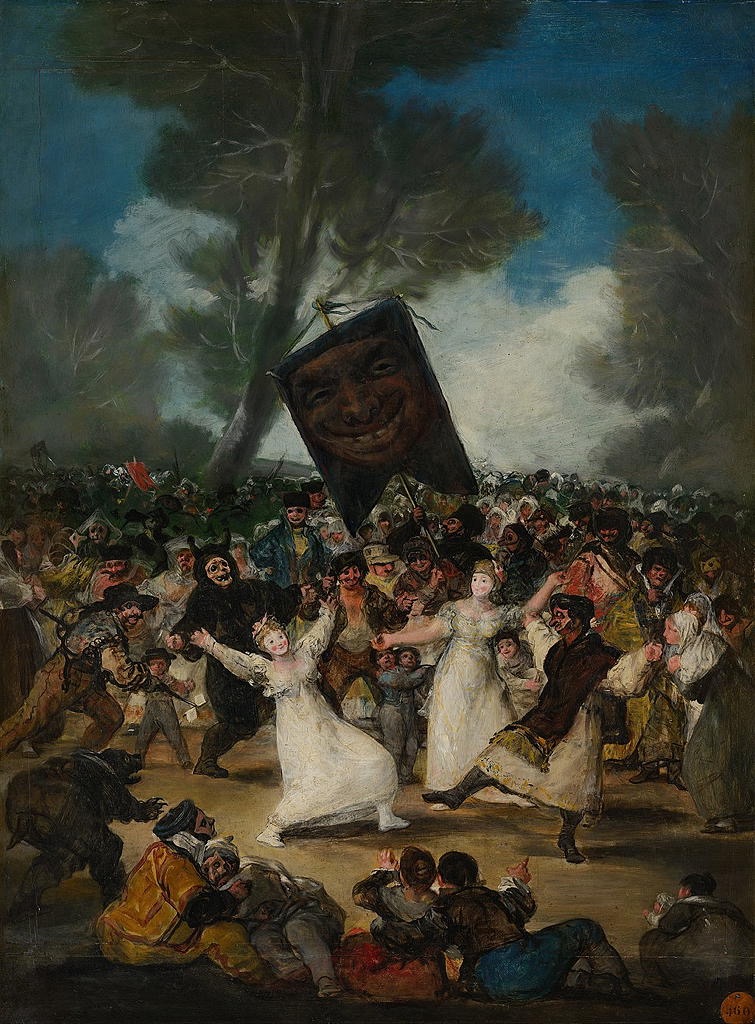
GOYA: Entierro de la Sardina [The Burial of the Sardine] (1812-14)
" … how often they come true."
In my first year of junior high school, I began to get stomach aches. My mom took me to the doctor who concluded that my stomachaches were all in my head, not caused by any physical difficulty, but an emotional one. I was at the time struggling with a French class in which I'd enrolled under the delusion that I might one day be college bound. Enrollment in colleges in those days required two years of foreign language study. I abandoned my GrandDelusion of one day attending college the day I decided to follow my doctor's advice and drop the French class. My stomachaches abandoned me shortly thereafter, but I found myself lacking a GrandDelusion in my life and feeling its absence. You see, I subscribe to the school of thought that believes in the absolute necessity of maintaining a GrandDelusion in one's life. Without one, I'm sunk.
With one, I'm sort of sunk, too, but sunk of a different order.
Cœurage
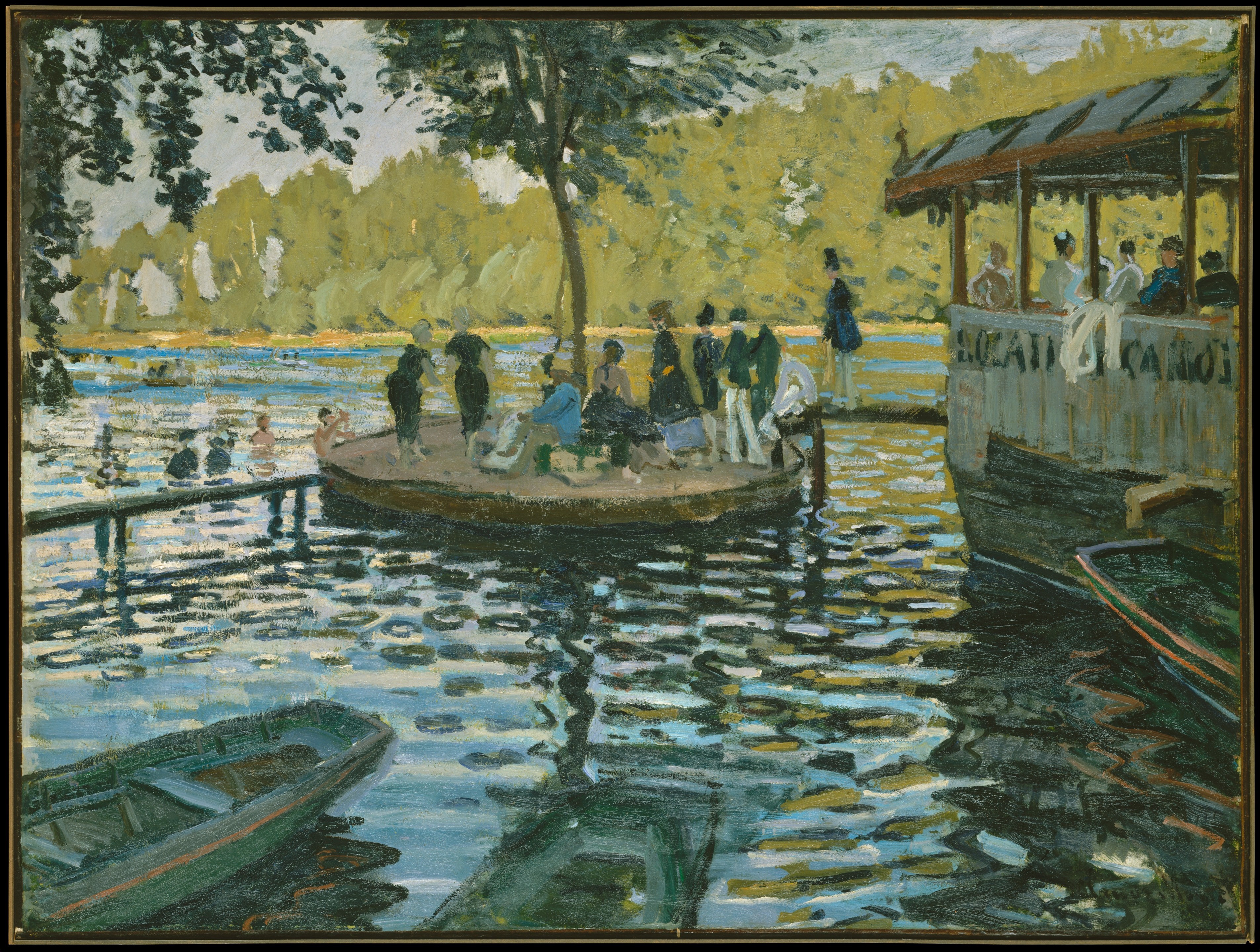
Claude Monet: La Grenouillère (1869)
"We're bred as critics …"
Authoring requires more heart than I can muster some days. Draft manuscripts simply must be reviewed with empathy or they'd all be reduced to red pen scratchouts the first time through. Only a wide open heart can prevent cringe-caused muscle cramps. One simply must, or I simply must, read with a sympathetic eye, which might render me my most worthless editor. My work could not survive without generous initial interpretations. If I wanted to discredit it, I could sink the whole damned enterprise in seconds. I cannot seem to write with a vengeance or author with one, either. I engage with disturbingly transparent skin, as if my spirit suffered from circulation problems. I wear a sweater and thick socks, protecting myself from the often shocking encounter with the real world and her expectations. I must write from my heart and author from there as well. This simply seems fundamental.
I am taken by the root from which courage sprung, the Latin cor (meaning heart) and the French Cœur (also meaning heart.)
TimeOff
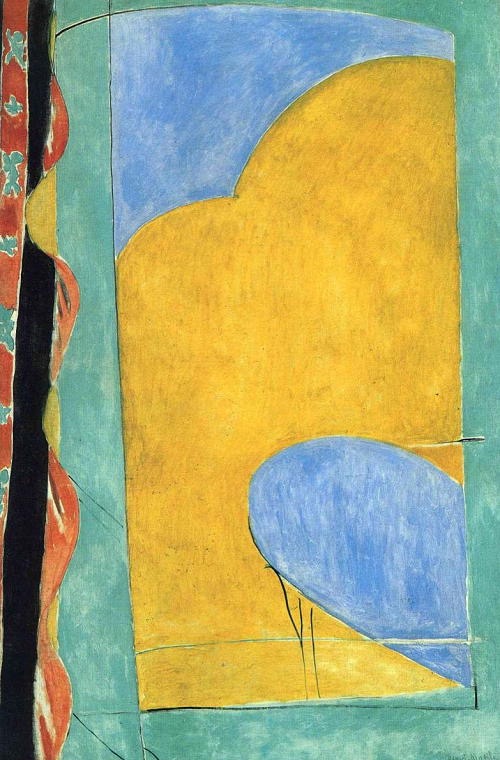
Henri Matisse: Le Rideau Jaune [The Yellow Curtain] (1915)
" … a man scribbling his living."
For me, writing and even Authoring serve as professions which do not come with TimeOff. I work weekends, holidays, even days of holy obligation, for writing and Authoring seem more lifestyle than job. Every morning seems to bring a superior personal obligation for me to engage, however holy or otherwise. If one works as a writer, one works as a writer, always practicing, never finished. Authoring so far seems no different. One does not remove one's writing boots, kick back, and forget the latest engagement. Writing doesn't finish. It's never done. Just as soon as I finish my daily essay, I'm copyediting the thing. I usually read it through about a half dozen times before I'm satisfied that I've caught all the errors I inadvertently imbedded in it, but even then, I'm apt to return again later to find a fresh couple needing correction. It's not uncommon for my Friday review of my week's writing to uncover yet another few lurking shortcomings needing fixing. The writing work's truly never done.
Authoring, too, seems fundamentally insurmountable.
a clean, well-lighted place
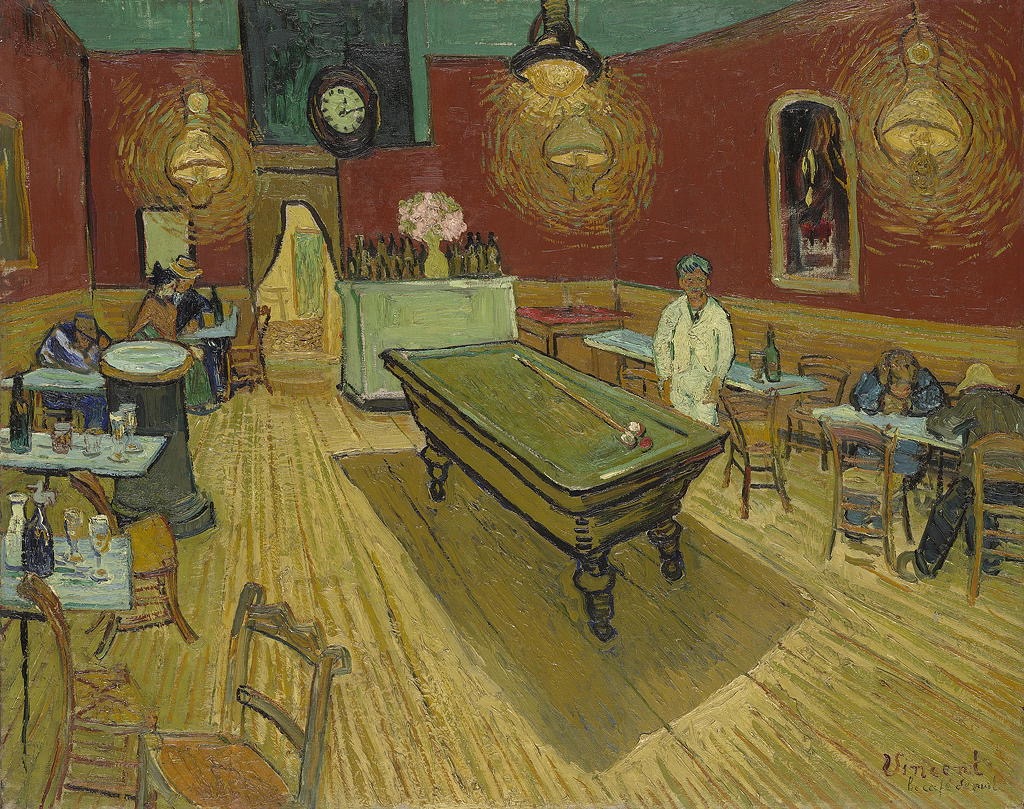
Vincent van Gogh: Le Café de Nuit [The Night Café] (1888)
" … I'm seeking immortality …"
Visiting Portland after a long winter and Damned Pandemic-induced absence feels as refreshing as a visit to Paris or Rome. Compared to our home near the center of the universe, it's a major metropolis. Further, due to the efforts of an inept surveyor, Portland's city blocks are tiny when compared with any other American city's, lending a human-scale aspect to the place. Even further, Portland features those exemplars of civilization, clean, well-lighted places for books. Portland's many bookstores encouraged me to pursue my literary leanings, for the very best future I could imagine featured me on one of those well-organized bookshelves in the old Beaver on Hawthorne or the original Powells, or even A Clean, Well-lighted Place For Books in San Francisco. I imagined myself shelved among masters, the E. B. Whites and James Thurbers, the John O'Haras and Eliot Pauls, and so I eventually was, but rather too near the end of the reign of the great American bookstore.
It's been half a generation now since the bookstore first felt the hand of internet commerce.
SenseMaking
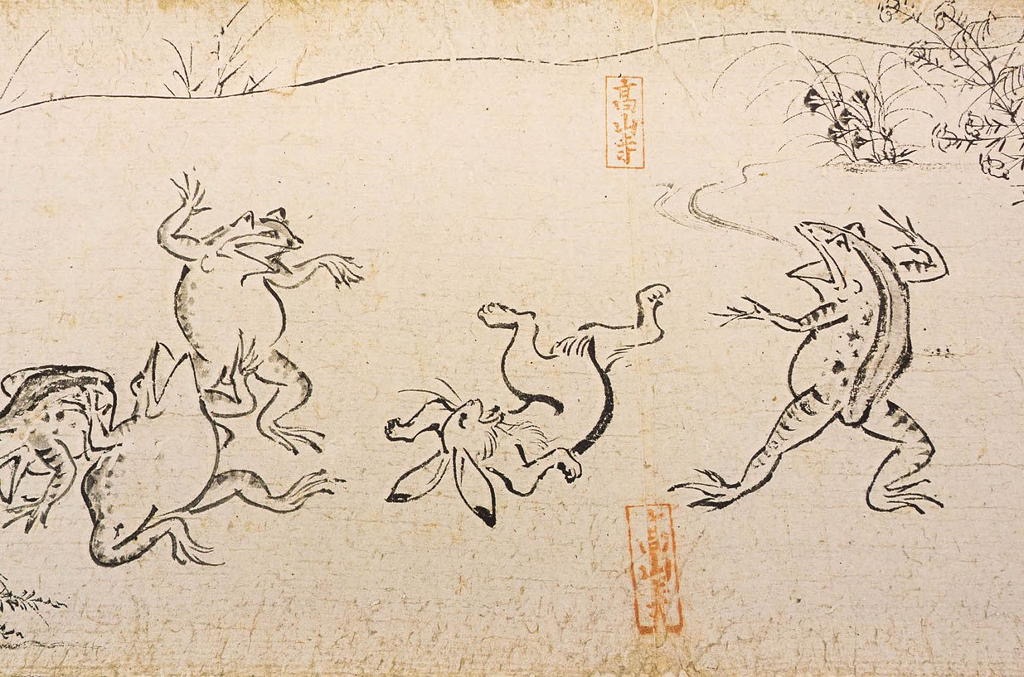
The Frolicking Animals scroll (Chōjū-jinbutsu-giga) from Heian Japan (mid-12th century)
" … SenseMaking, not necessarily about making sense …"
I've been trying for two months to schedule a Scheduled Maintenance appointment for The Schooner. I'd been really good at keeping each prescribed appointment since we bought the car, though it was easier when the dealer was just down the hill from us and I could just stop in to schedule a visit in person. Now that we've moved out toward the end of every known distribution channel, the closest dealership's fifty miles away. I considered just having my favorite local mechanic take over the maintenance, but he maintains a steady three month waiting list for appointments, so The Schooner's odometer would be at 55,000 miles before we could complete the 52,000 mile service. I'm now trying to negotiate away the 52,000 mile service in favor of just performing the 60,000 mile service early because I've lost faith that I can schedule the appointment much before the old odometer clicks over 60K.
The dealership's website features a futuristic scheduling application which was apparently intended to handle all appointment scheduling.
InsideOut
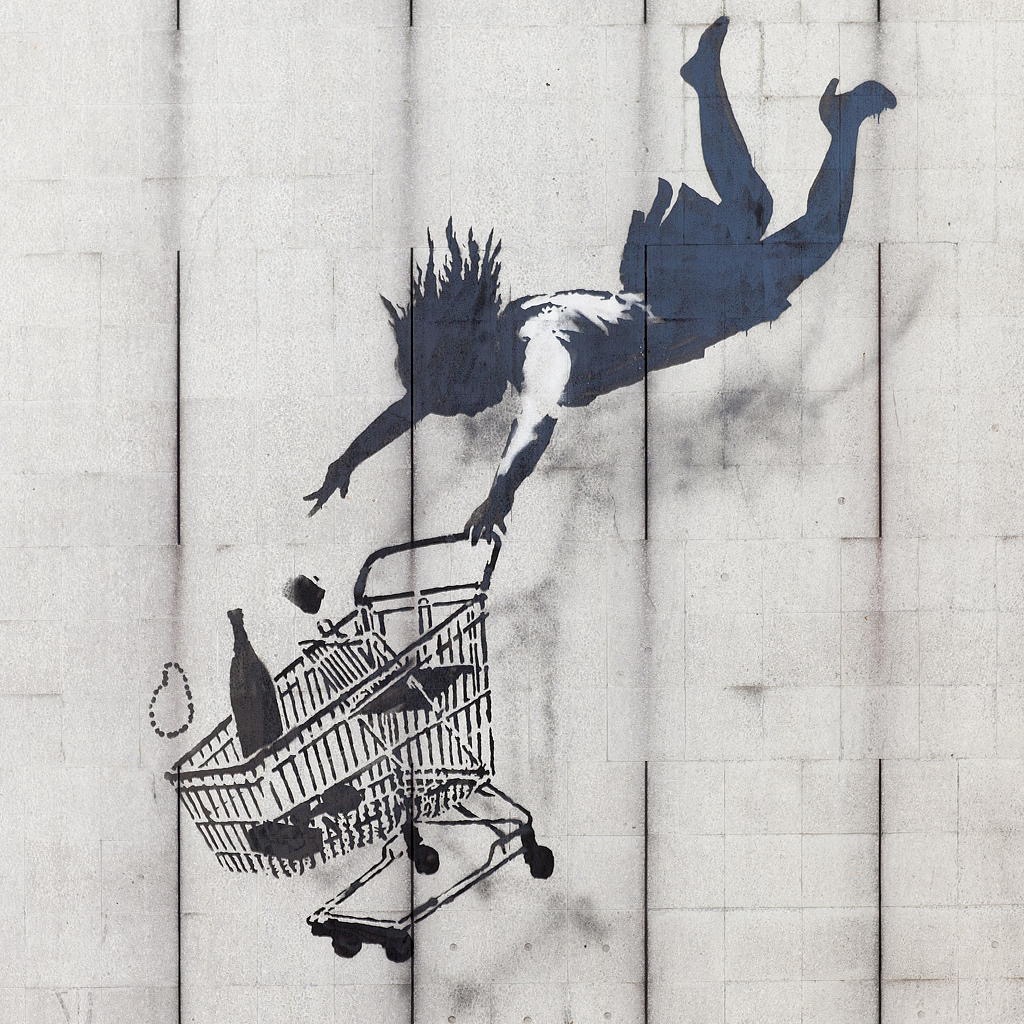
Banksy: Shop Until You Drop [Street art, Mayfair, London] (2011)
"I wonder if there's much of a market for that."
As my Authoring effort has focused my attention on the product of my writing, I've been spending afternoon hours actually reading what I've written. I finally submit to this work—and it genuinely feels like work to me—after procrastinating on significantly less important activities. I hesitate before reentering the Proofing space, and I consider this reluctance to be part of the experience. It's information. I'm not merely proofreading, of course, but also for the first time experiencing what it's like to be one of my readers. I sit in the chair across the room from myself and observe with great curiosity and almost equal dread. It seems somehow unnatural for someone to so closely observe himself. I sense that I might be toying with one of the inviolable boundaries like a space/time continuum. I feel concerned that I might alter an earlier self or glimpse from perspectives that I was never supposed to suspect, let alone perceive. I'm only wondering how I might describe this manuscript. Is it Little Red Riding Hood or The Boy Who Cried Wolf? What makes this different from its many siblings?
I sense that I'm dabbling in an InsideOut, for my writing seems to echo my ongoing internal narrative.
InCompetences
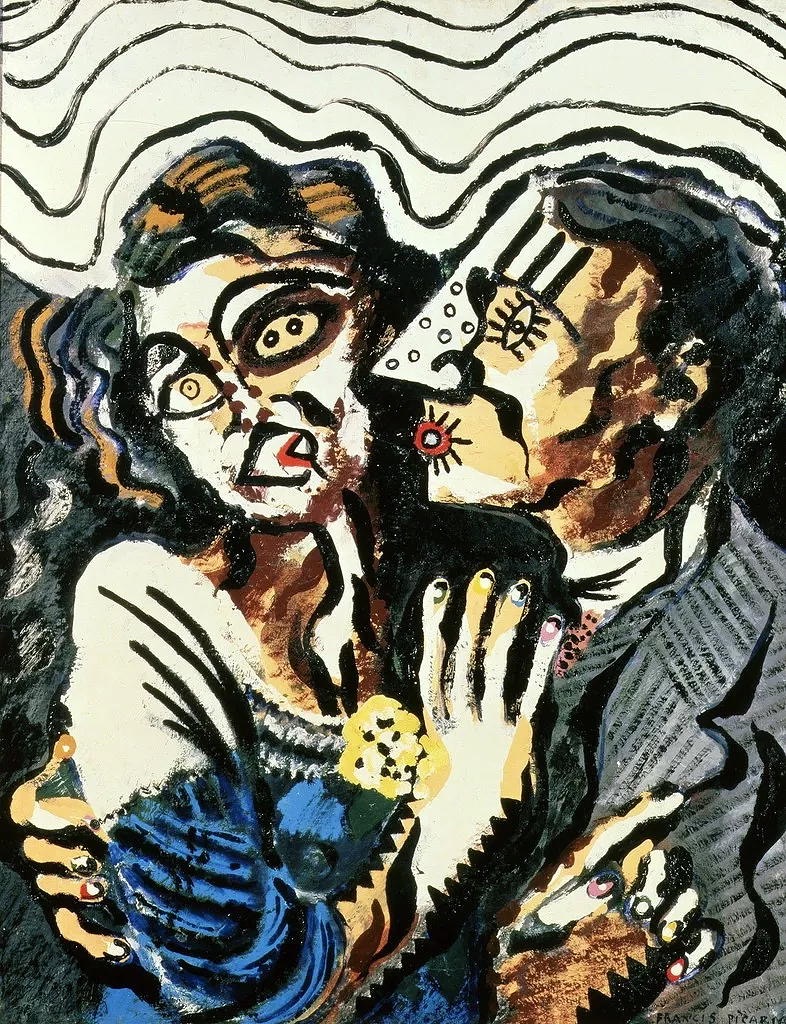
Francis Picabia: Première Recontre [First Meeting] (1925)
"If competence were a defining attribute, this world would have long ago crumbled. "
For me, writing seems an extended experiment intended to answer a simple question. Am I a competent writer? After a half century of experimentation, I've accumulated no conclusive evidence either way. I have seen evidence that I was, at times, at least bordering on competent, like when I learned that my Blind Men and The Elephant had become a bestseller, but that proved to be a lagging indicator, suggesting that I had at one time in the past been competent enough to pen a popular title, but it could neither suggest nor prove whether that gift had persisted into then present times or whether it might extend even beyond present time into any future. My experimentation continues. I each day manage to muster enough foolhardiness or courage to face the blank screen and begin again. Some days, like yesterday, for instance, I managed to feel competent as I wrote, a rare enough occurrence for me to make a note in my lab book. Further, I felt that the result, the surviving essay, proved to be top notch. I impressed myself. Then I went on to the other activities involved in my budding Authoring practice and fell on my face. I'd encountered yet another in my deep inventory of InCompetences.
I do not feel completely incompetent.
Mindlessnessing
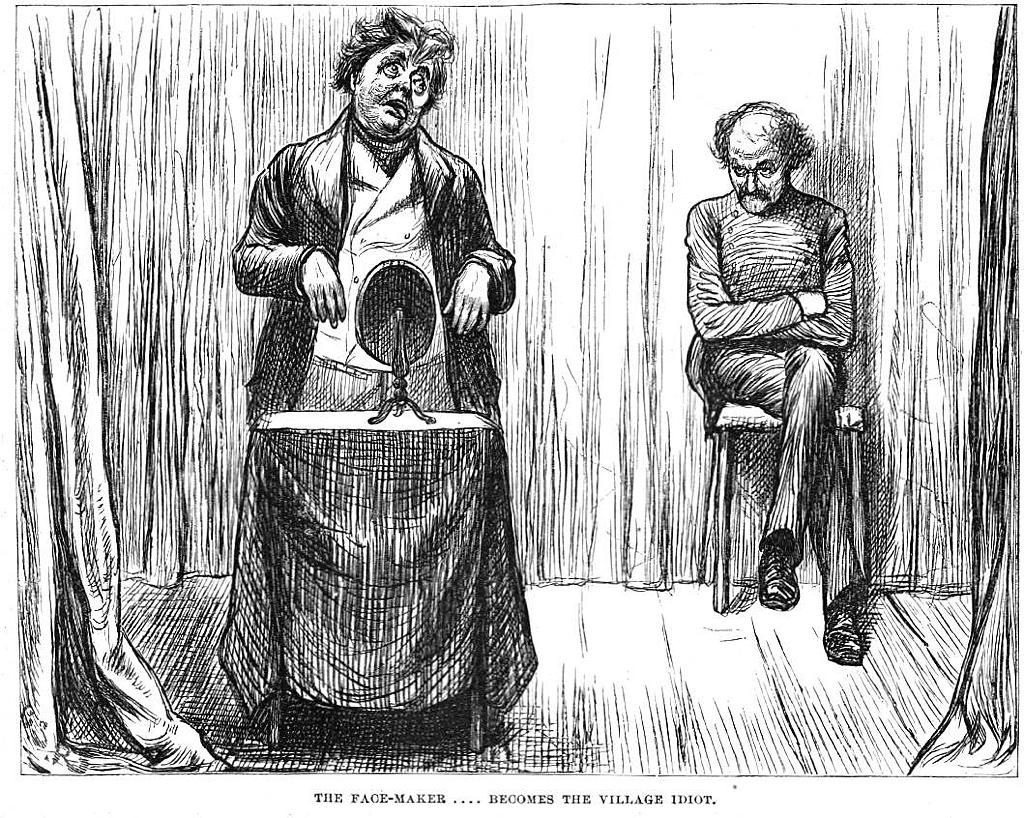
Charles S. Reinhart: The Face-maker . . . becomes the Village Idiot (1876)
"Hardly an ounce of mindfulness required."
Mindfulness has become a topic of popular conversation. People offer training to increase and improve one's mindfulness, and by all reports, that sector of the economy has been booming, this in spite of the contrary trend that most work remains at least ninety percent mindless effort, and growing. I see nobody—absolutely nobody—offering the mindlessness training so sorely needed in this post-industrial economy. The late nineteenth century industrial boom utterly depended upon the efforts of a few committed engineering types who dedicated themselves, their lives, to redesigning manufacturing from the sole purview of skilled artisans into steps so simple and fundamental that a well-behaved village idiot could excel in essentially any trade. The mindfulness necessary to produce virtually every consumer good plummeted between 1850 and 1920, such that mindlessness became the hottest commodity in the overheated job market. Millions of ignorant immigrants, some of your and my forebears among them, were welcomed to our shores and into jobs designed to make the average person stupid and the exceptional, insane. Each successive automation wave, up to and including computers and smart phones, left ever fewer jobs requiring mindfulness and ever more requiring an increasing proportion of Mindlessnessing. And here we are today.
It should not be the surprise it seems, then, for me to discover that even Authoring has become a victim to modernizing Mindlessnessing.
RevisitingPurpose

Guercino: Allegory of Painting and Sculpture (1637)
"I answer another question entirely …"
As I "finish" manuscripts, preparing them for sharing on into the world, I catch myself asking the inevitable question. "Are these works living up to my original intention for creating them?" The answer might prove unimportant for judging their quality as writing or even as literature, but I have not been occupied these past four and a half years just writing or merely producing literature, I have been—or intended myself to have been—fulfilling an original purpose. It might prove to be a fair question to consider whether I seem to have spent my time focused or if I became victim to some distraction. Lord knows I have encountered plenty of distractions.
That I even need to ask myself the question might suggest something about my writing practice.
SecondOrderStorytelling
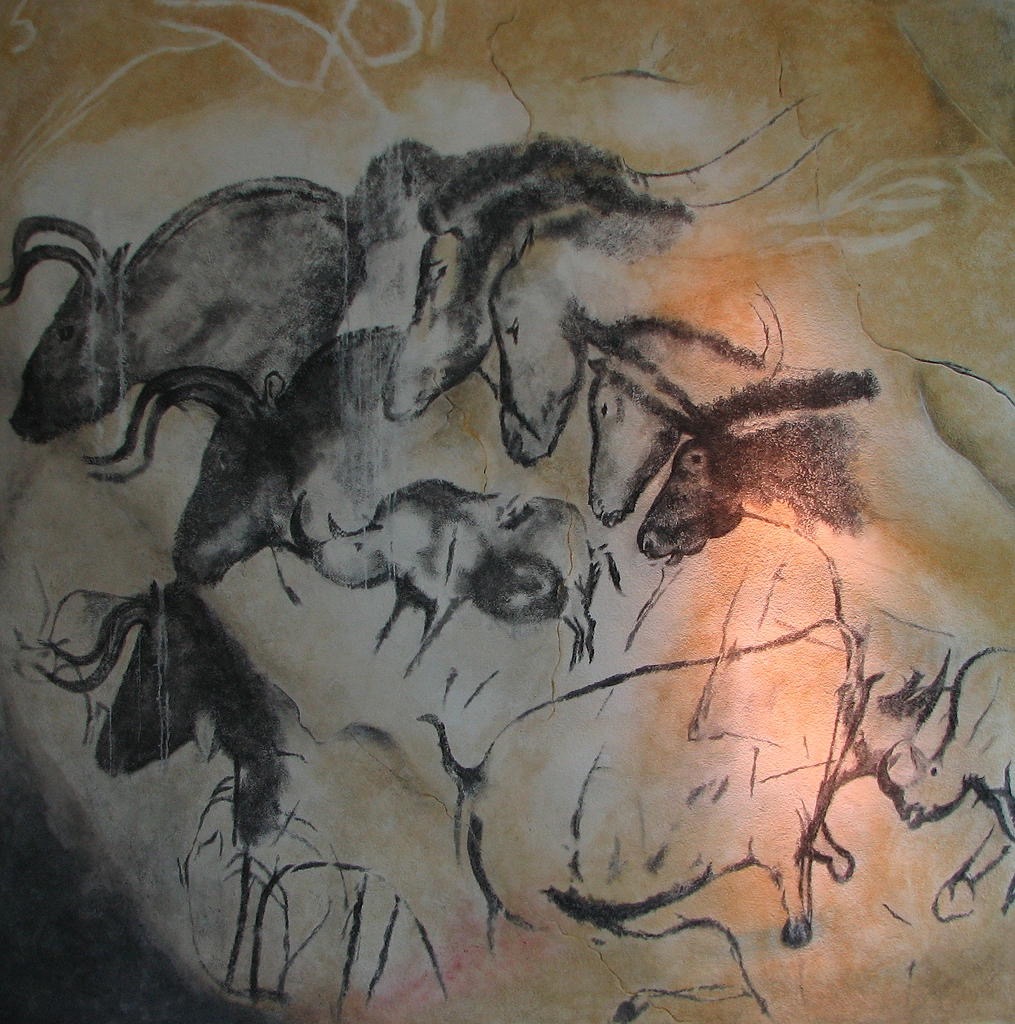
Unknown: Replica of paintings in the Chauvet Cave (Aurignacian Era—32,000 to 30,000 years ago)
"Authoring's also like this."
As I finished reading another draft manuscript, having proofed and corrected it, and for the very first time experienced it as a complete work, I remembered what came next. Now that I'd told the story, I would be called upon to tell the story about the story, to commence with a period of SecondOrderStorytelling. If writing a book's challenging, and, believe me, it is, writing the book about the book proves even more difficult for this humble and often humbled scribbler. I imagine a promoter of the ancient artists who created the work found in France's Chauvet Cave directing those artists to explain their work, pointing out that future generations, to whom the work would inevitably belong, might struggle to understand the purpose and significance of the artwork without a crib sheet interpreting it for them. The artists, skilled in the visual arts, might well have struggled to satisfy this perfectly reasonable request, them not possessing a written language yet and all. The same fate befalls the modern writer aspiring to authorhood, for he, too, feels as though he lacks a written language adequate to explain what he readily admits might prove difficult to sell if he cannot find a way to tell the essence of his story without forcing his potential audience to actually read the manuscript and draw their own conclusions. He's called to explain himself.
I can imagine Melville mumbling that his book's about a whale.
Rhythmia
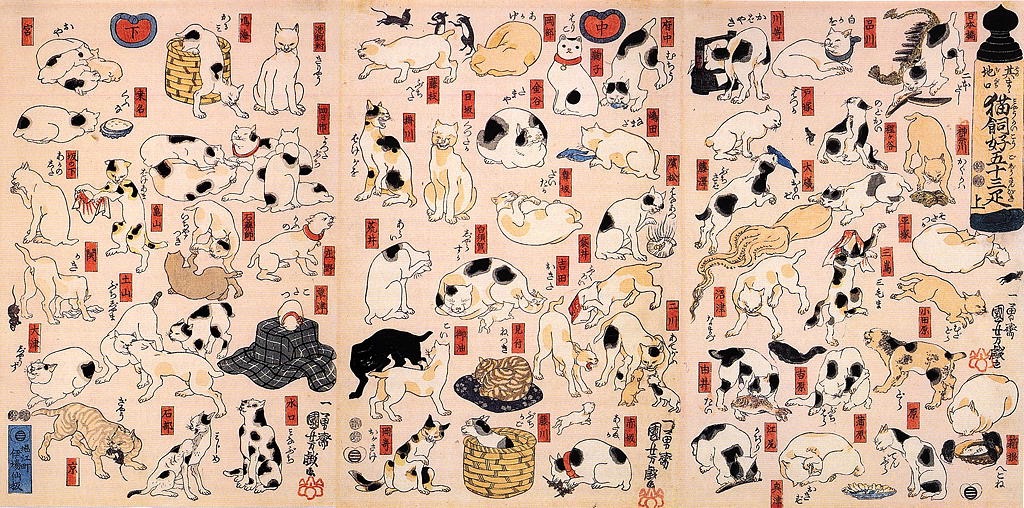
歌川国芳 (Utagawa Kuniyoshi, 1798 - 1861): Cats suggested as The Fifty-three Stations of the Tōkaidō
" … the effort hardly feels like working …"
Each new beginning seems to induce an arrhythmia of sorts, a break in the accustomed cadence and flow. The new pace might be sought, even insisted upon, but the first few clicks will lack some essential, though I'm unlikely to be able to describe what. Something will be missing and my world will feel off kilter. I won't know precisely what's wrong or what to do about the apparent imbalance, other than to simply soldier through it. Then, of course, I'm soldiering rather than performing and even I notice that difference. I get to wondering what happened to my once relatively effortless performance and why every damned thing I touch requires almost superhuman effort. I know, of course, but knowing, if anything, just makes the situation seem worse because if I can diagnose, why can't I resolve? I know I've lost my rhythm, my Rhythmia, but never really knew how I'd found it before. I'm tempted to suggest that I never once before ever found it, but that it exclusively found me. I wonder if it might ever find me again or if I've somehow stepped off the world I'd always known, doomed now to move without a backbeat, without a cadence.
Then one afternoon, the Rhthmia returns, at first unnoticed.
Cogitating
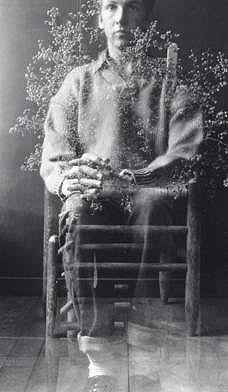
Robert Rauschenberg: Postcard Self-Portrait, Black Mountain (I) (1952)
"I ain't no action figure."
I do not behave like a standard action hero might. I decide, then slip into a period of concerted Cogitating before acting. It might even appear to the inexperienced that I do nothing at all in response to deciding, that I'm not living up to my commitment. It might even appear that way to me. I could get moody until I give myself over to accepting what seems to be my usual response to deciding something. I flee to my head, deep within my head, and commence to Cogitating. I might insist that I'm thinking then, except I cannot be certain whether I'm thinking or not. I remain uncertain what thinking entails so I cannot tell if I'm engaging in that. Cogitating might be more a meditative than a thinking state, meditation being an immersive but not necessarily an analyzing or deconstructing one. I tend to float away from key choice points having chosen but not yet ready for action. I tell myself that my Cogitating prepares me to take right action without wasting effort with hasty reactions. I tell myself this story without really knowing if I'm telling myself the truth.
The truth might be that I have no good reason, no clear justification for slipping into Cogitating inaction following making a decision.
Gatekeepers

A gatekeeper at the Srivaikuntanathan Permual Temple
"The Gatekeeper administers the first test."
I feel as if I might have wrestled the content piece of Authoring to a rough ground over the past week. The publishing software finally gave up her secrets and I assembled a second manuscript and commenced to reading into if not yet through it. I maintain a queue of future compilings and a rough process by which to achieve them. I feel a little bored, which suggests that it might probably be time for me to open another front in this Authoring effort, the front where I commence to contacting Gatekeepers.
Gatekeepers terrify me. Always have.
Author-itative

Forged self-portrait of Albrecht Dürer.
" … never muttered another word thereafter."
We've long known that giving a guitar to a twelve year old dramatically increases the risk that said twelve year old will start crafting verse and become, at least in their own mind, uncommonly wise, and then start dispensing advice and spouting "folk wisdom." We understand less well a similar effect resulting from teaching someone to write. The risks might be tiny, but nonetheless exist, that the budding writer might discover urges to become an author. If so, it seems a short stroll down a fairly well-trod path before said writer comes to take them self seriously, perhaps all-too seriously, and steps over that line where ever after they think of themselves as authorities and so come to speak almost exclusively in the curious dialect favored by the Author-itative. They become bores and/or whores, assuming any of scores of similarly degrading roles in society. Extreme cases might be seen guest spotting on CNN, MSNBC, or, shudder, Fox. They might even sell a lot of books.
I have personally seen how this gift of writing can evolve into the curse of Author-itative prose.
Haunts
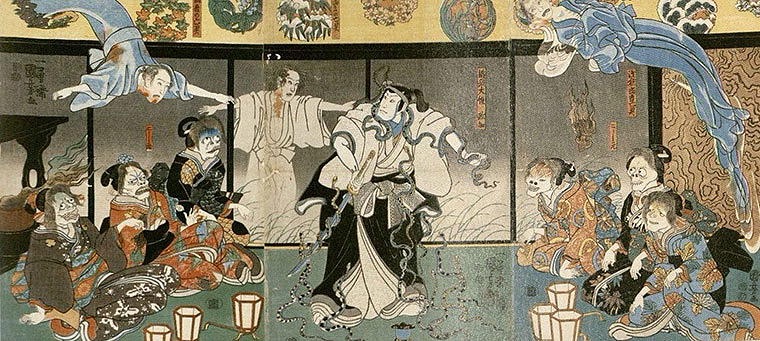
Utagawa Kuniyoshi: The Ghost of Asakura Togo (undated)
"Exclamation Point! Period."
If I possessed the power to give advice that might be heeded rather than mocked by people younger than I, I would find some way to convince those folks that they author their own stories. Because of this one fundamental fact, we might be incapable of victimization without our own active collusion. Plot twists notwithstanding, if we're each authoring, then we get to decide where to place the final piece of punctuation that designates the end of one of our stories, nobody else. An adage much older than I insisted that no story ever need end up a tragedy if its author simply waits until an uptick before calling the story quits. An uptick always seems to emerge, however modest. I won't argue that this world does not host true tragedies, absolute calamities, but I will insist that these are never necessarily the whole or essence of any story, and that it does everybody some good if the soul of a mangled body gets reported as transported to heaven after its fall. That's what Authoring contributes, and it's fundamental.
Not everyone—or even most—take the Authoring notion as far as actually writing anything down, but we all seem to collect our stories.
Authorthentic
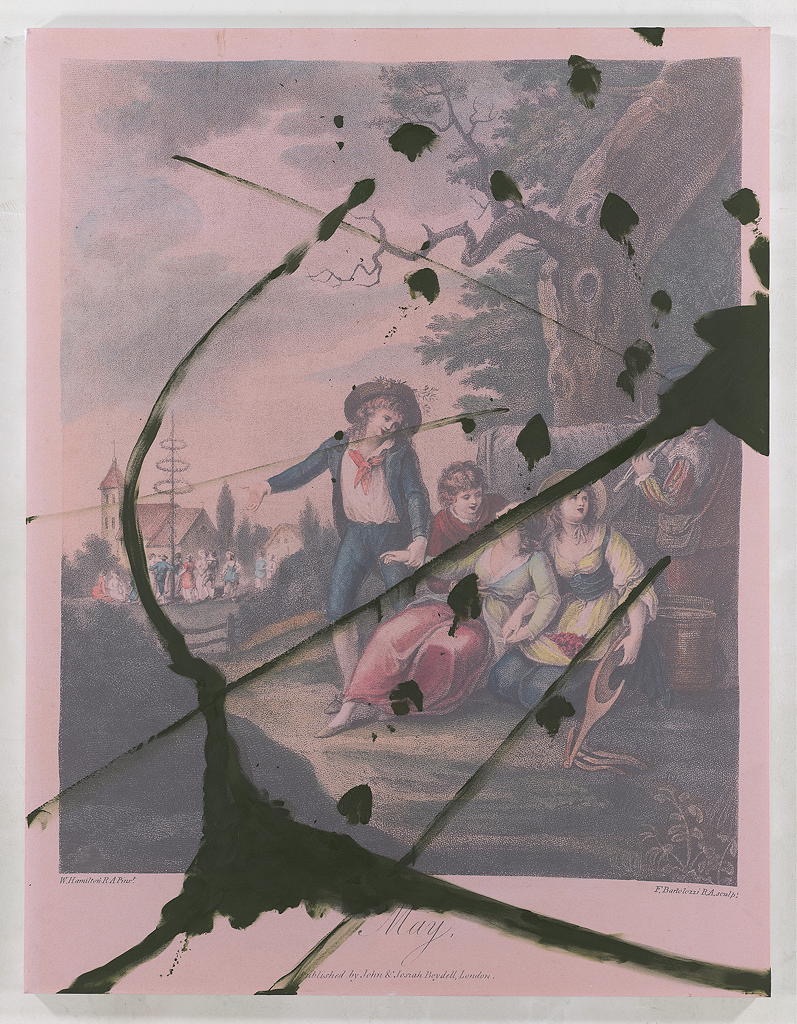
Julian Schnabel: May (2017)
"I will be rewarded with a blank page …"
I admit to feeling self-conscious about how I write. This likely stems from my never having received formal training in how to write, so I suspect that I do not write properly, or right, and never have. When I say that I feel self-conscious about how I write, I mean that I usually go unconscious when writing so that I won't be thinking about what an imposter I'm being while engaging. There's a deep shame there, too, as if my act of writing should necessarily seem offensive to you and that I really should, if I were in any way thoughtful, gift this world by not further polluting it with my misbegotten work products. I do not overstate my premise here. I want to be clear about my experience. I might choose to write in what passes, for almost everybody, as the middle of the night because my practice, my actual Authoring, probably wouldn't pass muster in the fuller light of any actual day. This part of my life seems best lived surreptitiously. Once the Authoring's finished, I feel free enough to post the result without often mentioning the process by which it manifested, a process which might well be shared by every author in the history of this world so far, though not often mentioned to their readers.
Maybe cost accountants perform a similar dance when they create capital asset pricing models. They probably should.
OpServing

Antoine Le Nain: Les Village Pipeaux [The Village Piper] (1642)
"I'm some days tempted …"
I'm taken by the differences between the life I described two years ago and the life I live today. This continuing Damned Pandemic has completely if subtly changed how I live. On my better days, I imagine myself on a mission, serving my country by observing strict protocols so as to do my part to inhibit the transmission of the virus and all of its variants. I duly upgrade my mask as suggested by the CDC. I mostly, and some days most excruciatingly, just stay home and look out my window, an OpServer more than an active actor in this world anymore. I've become a subvocalizing scold when I do venture out, pissed at all the maskless freeloaders dogpiling upon society, extending our travails, cynically shirking their civic responsibility. It would be easy, too easy, to acquiesce to the general ignorance displayed and just play along, give up, expose my position and volunteer to become a lab experiment that could quite easily kill me forever. Instead, The Muse and I keep driving, deciding when we see the overflowing maskless crowd overfilling our local tavern, to go find some more abandoned-looking business from which to order some supper to go. We even eat out at home now.
As a writer and a budding author, I some days struggle to feel as though I describe a world shared by anyone else.
Colluding
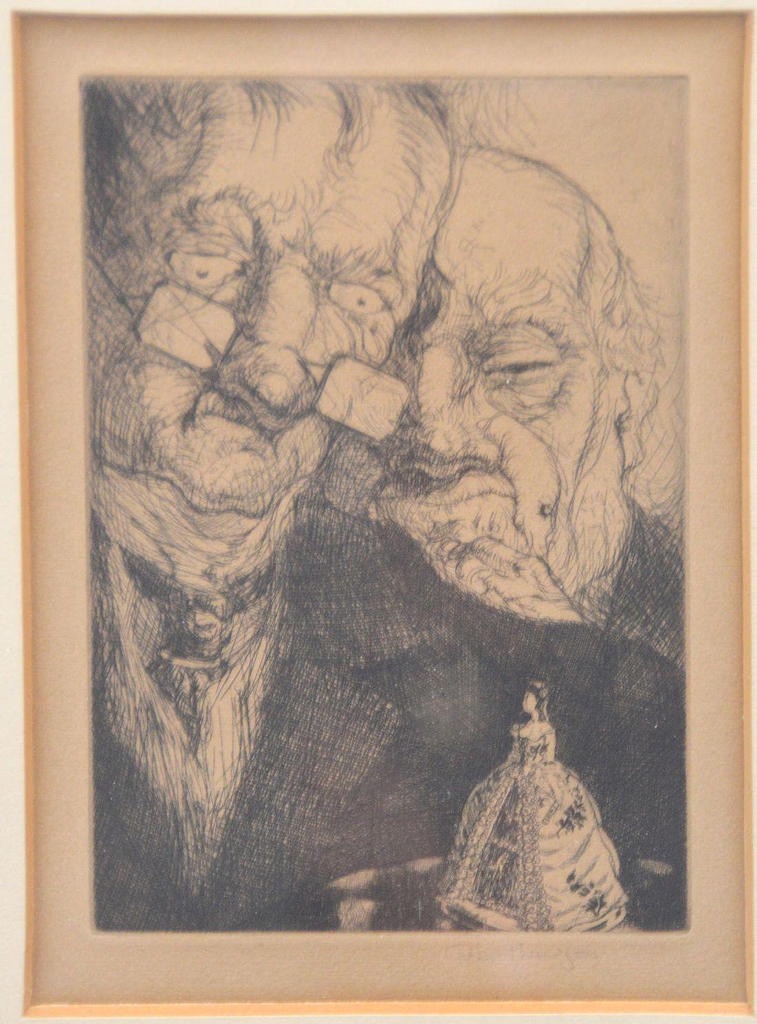
Robert Lawson: original etching, titled “the connoisseurs,” (undated)
"A conspiracy's gaining steam."
While writing tends toward an isolated and, indeed, isolating endeavor, Authoring becomes necessarily more social. It might take a village to bring any work to publication and distribute it beyond its author's orbit. Even in this age of viral transmission, those lowly-seeming individual producers usually have a community contributing and supporting their efforts, colluding in dozens of different little ways to make a real difference. In some ways, these helpers find their own way inside the author's circle, even when they're invited in, for these endeavors rarely seem terribly promising at the outset. Invitations get sent without great expectations that they'll be be warmly received, without knowing who might insist upon taking a lead. The resulting community expands organically, fueled by each member's own interests. In this sense, the Colluding seems inherently beneficial, occurring only because there's really no other way to get such things going. This describes what I've long referred to as a ProjectCommunity, a benevolently Colluding conspiracy of dunces intent upon becoming geniuses. Screw projects, we'd much rather collude and conspire.
As a writer untrained by formal writers' workshop orientation, I most fear the critics.
Dedication

John Singer Sargent: Gassed (1919)
"The universe has seemed dedicated to thwarting my forward momentum …"
It seems simply axiomatic that any attempt to accomplish anything novel attracts imps, so I should not feel in the least bit surprised that every attempt to delve more deeply into Authoring has encountered frustrating complications. Trusted software fails, or seems to, then mysteriously seems to heal itself after stalling progress for a couple of days. The mere act of plugging in a faster printer, borrowed from The Muse's office, appears to have uncovered a malware infestation which then mysteriously disappeared. Small steps seem more like stumbling blocks and every damned thing I attempt to initiate becomes either another damned thing or the same damned thing all over again. I recognize these experiences as standard Dedication tests, apparently necessary encumbrances intended to test mettle and stomach. If I cannot swallow these tangles, I might consider aborting my mission now, because worse will very likely be coming, and worse in ways that would certainly prove intolerable today, but following some initial conditioning, might well prove to be less than overwhelming. I've been building up immunity to terminal disappointment by seemingly serially disappointing myself.
It seems a wonder I've made any progress, given that I feel as though I've mostly been encumbered from moving very far forward.
Timelessnessing
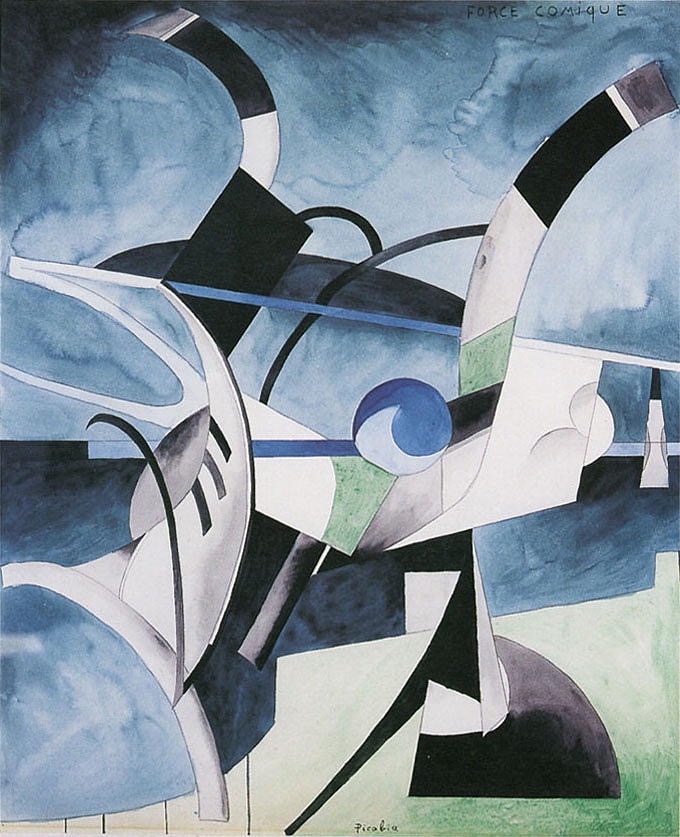
Francis Picabia: Force Comique (1913–14)
"Time's a jealous one …"
Authoring, like writing, can be time consuming. I might spend three hours crafting a single thousand word essay and exhaust a few days assembling a quarter's accumulation of posted pieces into a draft manuscript, then a few days proofing that manuscript, a few hours correcting the master manuscript, all that before releasing the semi-finished work to broader review and critique. The process, if, indeed, it qualifies as a process, seems interminable and I suspect that it's actually impossible to maintain much enthusiasm for a work that takes so damned much effort to produce. There's just something about working hard that encourages moving beyond the effort and into well-earned leisure, but writers and authors do not work for the purpose of not working any more, or they sure don't seem to. They seem to work for the purpose of continuing to work, for properly engaged in, their, our, work might be better labeled play. What do I do for work? I play, but only when I remember that I can make it that way.
Any time-consuming anything tends to weigh heavily upon the one engaging, for time, a concept apparently without physical substance, weighs more than any other material.
Learnering
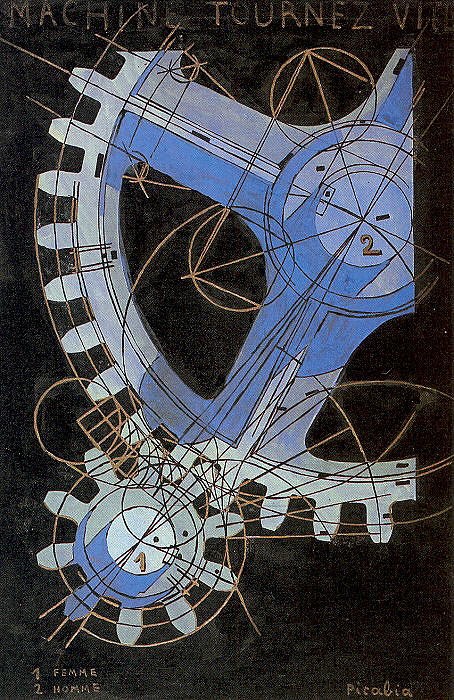
Francis Picabia: Machine Turn Quickly (1916–1918)
" … even more humiliation before me …"
I know of no more pitiful state than that of a learner. The learner hangs suspended between two states: ignorance and understanding, where the presence of the former becomes ever more prominent and the absence of the latter becomes ever more apparent. No resolution resides within the learner's space. Were there a process by which one might gauge progress toward understanding, the experience might feel different for the learner, but, alas, no such process exists, though competing theories about what that process might be continually add to the irresolution. The learner's experience tends toward the chaotic with resolution uncertain. It's a genuine wonder to me why anybody ever volunteers to learn anything. Ignorance being bliss seems a damned good argument against all forms of learning, and I mean this.
Once the learning's completed, one might hold some chance of being recognized as being learned, at which point the fresh scholar might lord their superior understandings over others, thereby earning their eternal enmity.
Relearning
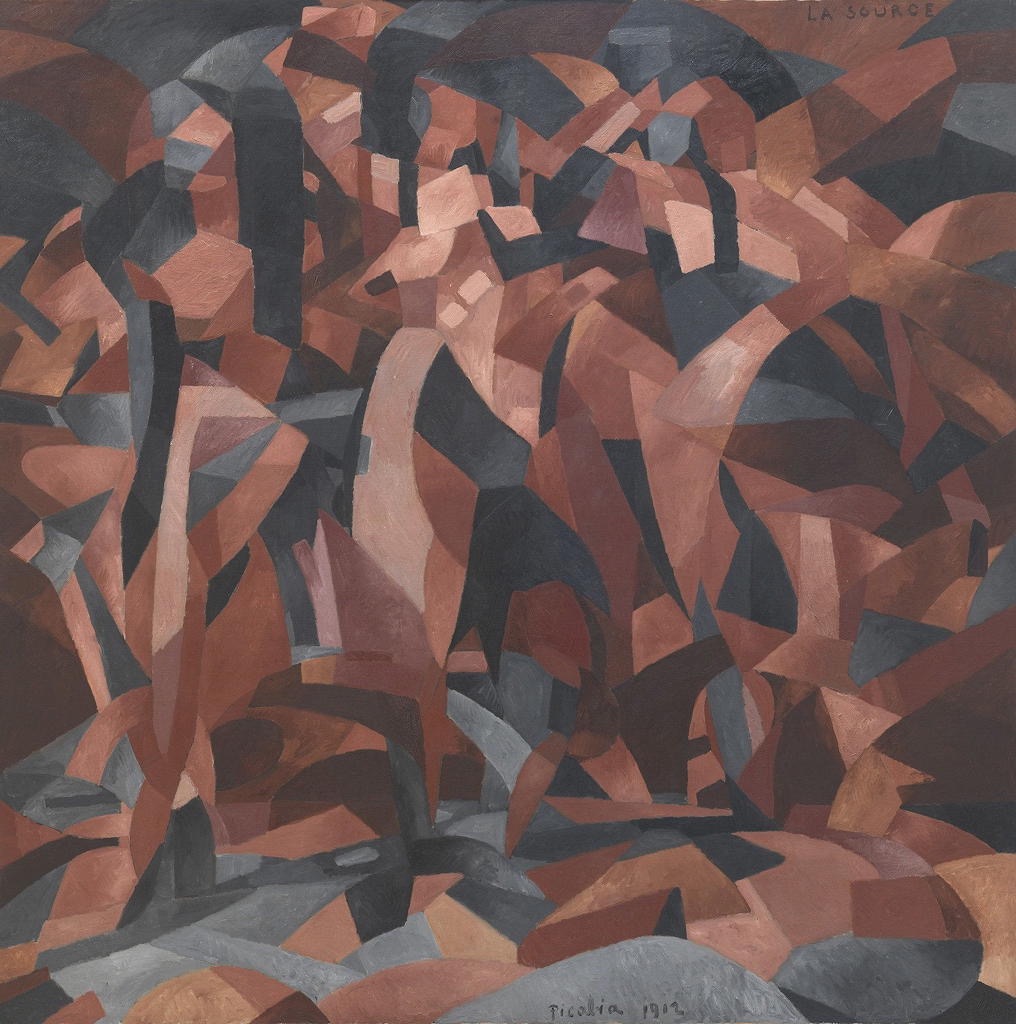
Francis Picabia: La Source [The Spring] (1912)
"This Authoring crap ain't for wimps"
It might be a feature of modern times that I seem to have only fragmentary understanding of how most things work. I know enough about automobiles, for instance, to drive them, or many of them (not Buicks), but not enough to fix them should they break. I tried at one point in my life to learn enough to be able to perform simple periodic maintenance on my vehicles, but vehicles have changed since then, and even then, I was prone to making mistakes when taking care of my cars. It's genuinely difficult to clean up a four quart oil spill in a driveway after discovering that you forgot to replace the drain plug before attempting to refill the crankcase. Difficult and embarrassing.
Most of the software that I use, I understand no better than I understand automobile maintenance.
Howsing
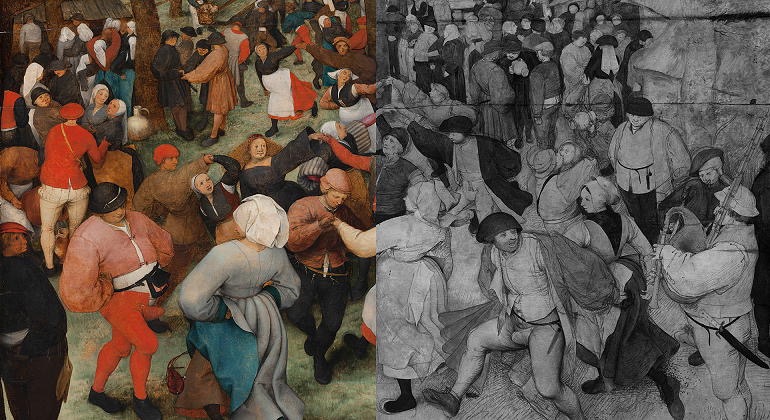
Pieter Bruegel the Elder: The Wedding Dance (1566)
" … new worlds emerge."
I caught myself, while proofing that latest manuscript, reading for something other than story. It's usual for me, when picking up a book, to read for content. Style might enter into my perusal, but never most prominently. I'm following the story, hoping that the author's word and phrasing choices won't unduly encumber my effort. Ideally, when reading, the style should remain essentially invisible, like a neutral wall color, there to frame the content never to overshadow it. But proofing my own writing, I already know the story. I'm learning that the story pretty much takes care of itself. This time through the work, I'm looking a little deeper than story at the technique, the style, the manner of describing I employed. Does it exhibit the necessary consistency? Does it encumber the story? Does it adequately hold the space?
I guess that the style of writing sets a context, and context tends to deeply influence everything around it.
OpeningShop

Robert Lawson: The March of Progress (circa 1930-1931)
" … further tedious justification …"
I discovered what I always discover when I finally finished circling the spot and settled into reading the next of my "finished manuscripts." The first few pages proved awkward reading, but before I hit the fiftieth, I'd settled into the rhythm of the writing and caught myself almost enjoying the experience. The autobiographical element proved very attractive for me, for it enabled me to relive past experiences. The pieces were spare sketches but lifelike enough for me to recognize myself, or a part of myself, passing by before my eyes. Short of a mirror to peer into, what could possibly prove more diverting and interesting? The flow of the work, which I'd anticipated might prove choppy, wasn't. It seemed to pretty much work, though I'd need a book designer's eye to confirm this impression. I expected to find further excuses for not finishing the work, but I stuck to it instead, which left me feeling as though I'd opened up another department in my book producing operation. I was OpeningShop.
I have spoken here before about how I tend to catastrophize upcoming effort.
Show&Tell
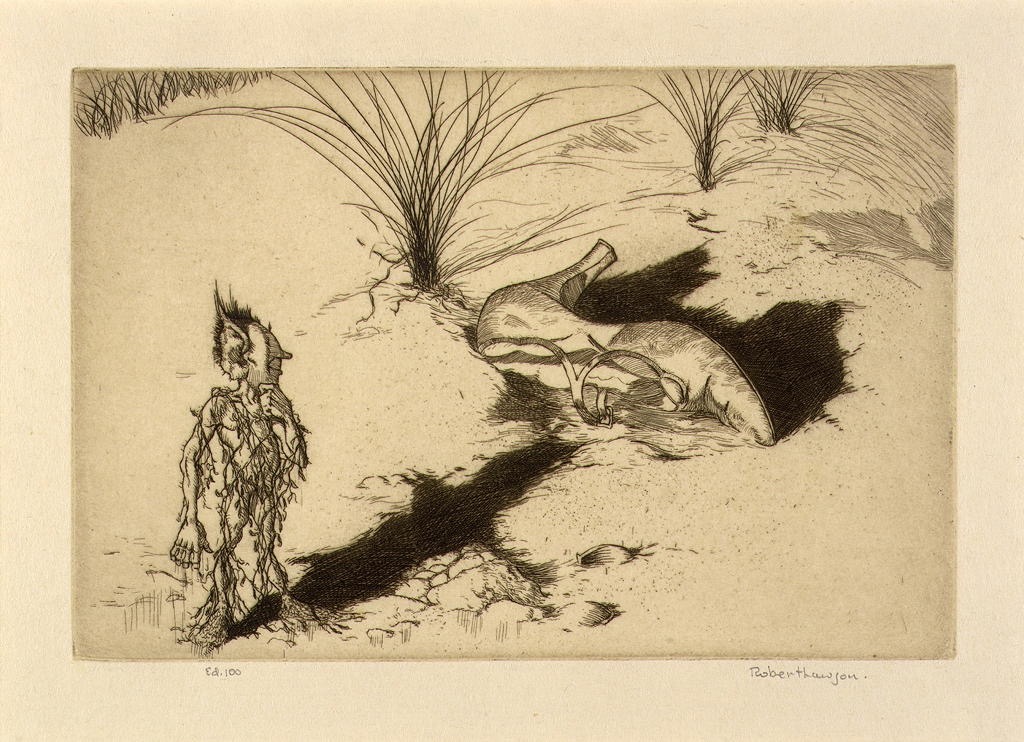
Robert Lawson: Little Elf by Big Shoe (not dated)
" … hopefully not Arithmetic."
I have a lot of material, much of it uncatalogued. Twenty years ago, I had several file boxes filled with pieces I'd written. I still have those, unopened in the interim, and several times more volume, newer stuff, less accessibly filed. I figure that most of all of that stuff was practice, warm up pitches honing my approach. I was preparing for the day when I might be called upon to commercially create, in the bigs, but that call never came. I remember the shame I felt when I first considered submitting pieces to journals only to find that my inventory was thin. I set about trying to fill it in and may have gone a little overboard. I feel like a hoarder now, squeezing between piles of finished material so randomly organized that little within it could ever be located. It's a random access filing system where the product of every search can only be randomly selected.
I created perhaps a quarter of the material in now obsolete apps, ones for which nobody seems to make translators anymore.


